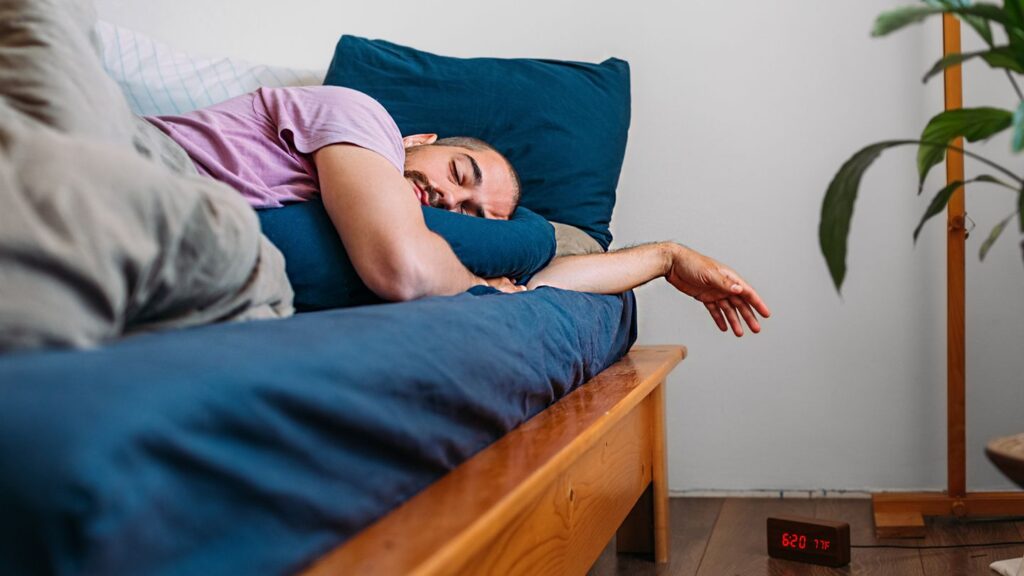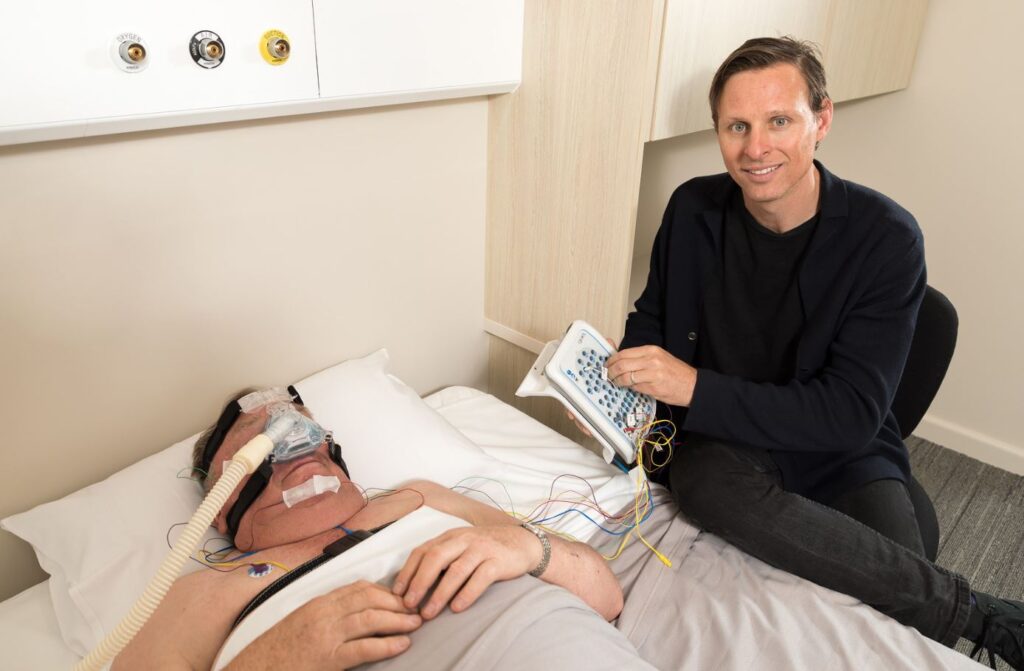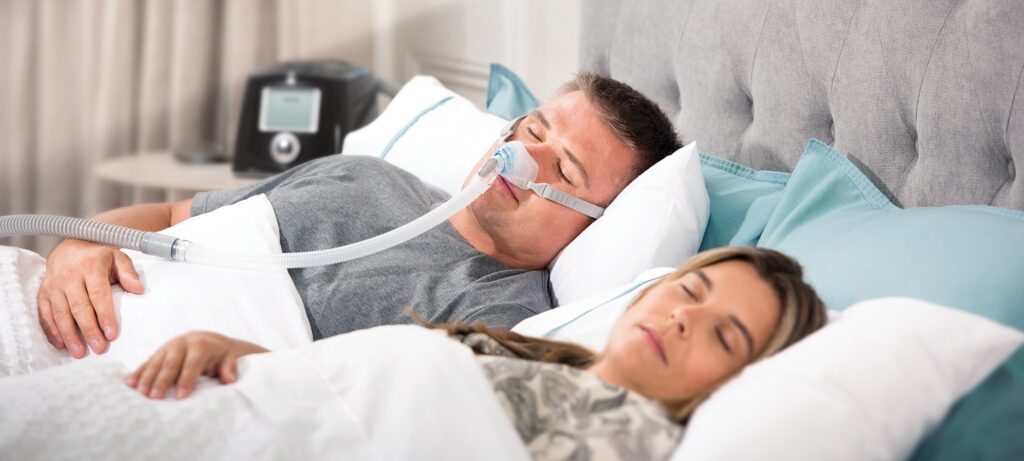A disorder known as sleep apnea occurs when there are recurring pauses in breathing while a person is sleeping. Your body will shake you awake so that it can get you to start breathing again if this occurs. Because of the many disruptions to your sleep, you are unable to get quality rest, and as a result, you wake up feeling more weary than usual.
However, sleep apnea’s effects extend well beyond just making you feel drowsy. When it goes untreated, it may increase a person’s chance of developing heart disease, diabetes, and other long-term health issues. Learn more about effects of sleep apnea.
During the course of the night, if your airway gets obstructed or collapses, you will have sleep apnea. It’s possible that as your breathing resumes, you’ll let out a piercing snort that will jolt you and anybody you share your bed with awake.
Sleep apnea has been connected to a number of different medical issues, including obesity and high blood pressure. These circumstances, when combined with a lack of sleep, may be detrimental to a wide variety of bodily functions and systems.
Related: How to Prevent Sleep Apnea
Mechanical breathing apparatus
Because it deprives your body of oxygen while you sleep, sleep apnea may make asthma and chronic obstructive pulmonary disease (COPD) symptoms much more severe (COPD). If you exercise more than normal, you can notice that it is harder to catch your breath or that it is more difficult to do the exercise.

Endocrine system
Insulin resistance is a disease in which the cells do not react as effectively to the hormone insulin. People who have sleep apnea have an increased risk of developing insulin resistance. If your cells aren’t able to take up insulin as effectively as they should be, your blood sugar level will increase, which puts you at risk for developing type 2 diabetes.
A cluster of heart disease risk factors known as metabolic syndrome has been linked to sleep apnea. These risk factors include high blood pressure, high levels of LDL cholesterol, high blood sugar levels, and a larger-than-normal waist circumference. Sleep apnea is one of the risk factors for metabolic syndrome.
Digestive system
If you suffer from sleep apnea, you have an increased risk of developing fatty liver disease, liver scarring, and liver enzyme levels that are much higher than usual.
Heartburn and other symptoms of gastroesophageal reflux disease (GERD) may be made worse by obstructive sleep apnea, which can make it even more difficult to fall asleep and stay asleep.
The cardiovascular and circulatory systems respectively
Obesity and high blood pressure are also risk factors for sleep apnea, and both of these factors put additional burden on your heart. If you have apnea, you have a greater chance of having an irregular heart rhythm, such as atrial fibrillation, which may raise the likelihood that you will have a stroke. People who have sleep apnea also have an increased risk of developing heart failure.
Nervous system
Central sleep apnea is one of the subtypes of sleep apnea, and it is characterized by a disturbance in the signals that are sent to and from the brain to facilitate breathing. This particular kind of sleep apnea has also been linked to neurological symptoms such as tingling and numbness.
Biological process of reproduction
Your urge to have sexual activity may decrease if you suffer from sleep apnea. It may lead to erectile dysfunction in males and may damage a couple’s capacity to conceive children if they are male.
Various other systems
Other typical symptoms of sleep apnea include: morning dry mouth or sore throat, headache, difficulty focusing, irritability, and difficulty paying attention throughout the daytime.

Sleep apnea, cardiovascular risk and metabolism
According to Jun, a number of studies have shown a connection between sleep apnea and health issues such as type 2 diabetes, strokes, and heart attacks, as well as a decreased lifespan. Why is there a relationship here? For one reason, obesity is very frequent among those who have sleep apnea, and according to him, being obese significantly raises the risk of diabetes, stroke, and heart attack. According to Jun’s explanation, “obesity is the primary culprit behind both illnesses in the vast majority of instances.”
However, it is essential to keep in mind that not all people who have sleep apnea are overweight. Furthermore, data reveals an independent relationship between sleep apnea and diabetes. According to Jun, “Our laboratory and others have demonstrated that sleep apnea is connected with greater risks of diabetes, irrespective of weight. Sleep apnea may also raise blood sugar levels.”
Losing weight is one of the most important things that individuals who are overweight or obese can do to cure or prevent sleep apnea. People who tend to store fat in susceptible areas such as the neck, tongue, and upper abdomen are at an increased risk of developing sleep apnea. This weight causes the neck to become narrower and presses on the lungs, both of which contribute to airway collapse while the person is sleeping.
As people become older, women in particular should exercise caution. This alters over time, since premenopausal women have a tendency to put on weight in their hips and lower bodies rather than in their bellies as they get closer to menopause. A higher risk of sleep apnea is associated with the gradual accumulation of fat in parts of the body that are stereotypically associated with men, such as the stomach.
When a woman reaches menopause, her hormones begin to shift, and as a result, she may start to appear more like a man in terms of where she puts on weight. “After menopause, women start to catch up to males in the rates of apnea, so now is the time to pay attention to the hazards of sleep apnea,” Jun says. “It’s a time to be paying attention to the dangers of sleep apnea.”
Improve your health by properly diagnosing and treating sleep apnea.
It is essential to seek treatment for sleep apnea since the condition may have far-reaching effects on a person’s health if left untreated. Although there have been some high-profile fatalities associated to sleep apnea, such as the death of Judge Antonin Scalia, Jun maintains that the actual danger comes from damage done over time. This is because sleep apnea causes harm to the body over time.
According to a measuring method known as the apnea-hypopnea index, the severity of obstructive sleep apnea may vary anywhere from moderate to severe (AHI). The amount of times throughout the course of an hour’s sleep that you stop breathing is what the AHI takes into account.
Takeaway
There are a variety of treatments available for sleep apnea, which, if left untreated, may interrupt your sleep throughout the night and put you at increased risk for a number of dangerous disorders. During the time that you are asleep, treatments like continuous positive airway pressure (CPAP) and oral appliances may assist in maintaining an adequate supply of oxygen in your lungs. If you’re overweight, losing weight may help improve your sleep apnea symptoms while also lowering your chance of developing heart disease.



